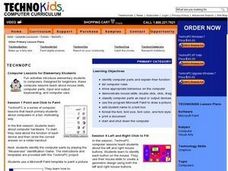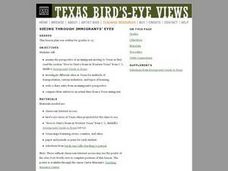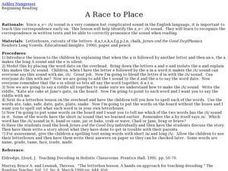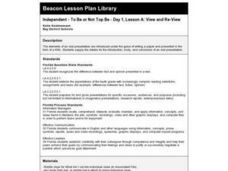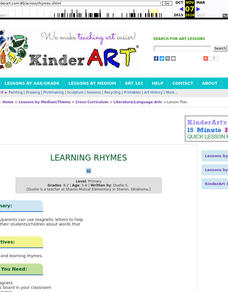Curated OER
Spelling Worksheet
In this spelling worksheet, students read sentences from the book Mystery in the Attic and choose which word is spelled incorrectly and then correct it. Students complete this for 5 sentences.
Curated OER
Word Art
For this word art worksheet, students color or paint the pictures of life experiences through language bubbles. Students complete 14 problems.
Curated OER
Student Self-Esteem
Students investigate human psychology by completing a worksheet in class. In this self-esteem lesson, students identify the importance of confidence in life situations and discuss why they should feel good about themselves. Students...
Curated OER
Techno PC: Computer Lessons for Elementary Students
Students explore computer science by participating in mini activities. In this graphic design lesson, identify the different components on a personal computer and define their purpose. Students utilize Microsoft Paint to create a digital...
Curated OER
Now You See It, Now You Don't
Students determine their eye's blind spot. In this biology lesson, students explain what causes this visual deficiency. They give real life applications of this concept.
Curated OER
Making a Multiplication Lesson Matter
Teaching students about multiplication can be made a little easier with lessons that will peak their interest.
Curated OER
Linear Inequalities
Ninth graders practice recognizing similarities and differences found in the graphing of inequalities and equations. Once observatioons are made they solve some of their own applying prior knowledge.
Curated OER
Say Ahh Went the Doc
Students recognize the short vowel O in written and spoken language. Through matching activities, they discriminate the short vowel /o/ from other vowel sounds. Students associate the phoneme with its letter representation and identify...
Curated OER
Seeing through Immigrants' Eyes
Students assume the perspective of an immigrant moving to Texas. They write a diary entry from an immigrant's perspective, describing how they arrived in their new town, what steps they take to get settled, and their feelings about their...
Curated OER
The Lady's Age
Students use a game to establish the context of solving problems in a systematic and mathematical fashion. They also solve various types of equations to find reasonable solutions.
Curated OER
A Race to Place
Pupils distinguish between short vowel a and long vowel a. They are introduced to the vowel-consonant-e pattern that changes short vowel sounds into long vowel sounds. They practice spelling words with the vowel-consonant-e pattern.
Curated OER
Give the Dog a Bone
Students listen as the /sh/ sound is modeled and discover the sound as it appears in the words "sheep", "fish", and "ship". They then play a secret game with a magic code placing the correct dog with its bone. Once all the words are...
Curated OER
Independent - To Be or Not Top Be - Day 1, Lesson A: View and Re-View
Second graders explore the introduction, body, and conclusion of an oral presentation.
Curated OER
Adaptable Animals
Students examine the types of adaptations that animals use to survive. They research the animals and report their findings to the class.
Curated OER
Caterpillar Capers
In these reading skills worksheets, students complete several worksheets of activities that help them learn alphabetical order, antonyms, and letter recognition.
Curated OER
The Water Cycle
Students study the water cycle. In this water cycle lesson, students examine how the water cycle works, what its functions are, and how to diagram it.
Curated OER
Cryptogram: Grade Two Vocabulary List One
In this cryptogram worksheet, students unscramble 9 words by placing the correct letter in the shaded boxes. Students then decode a cryptogram. There is no word list.
Curated OER
Cryptogram: Grade Four Vocabulary List One
In this cryptogram instructional activity, students unscramble ten words by placing the correct letter in the shaded boxes. Students then use the numbered boxes to decode a cryptogram. There is no word list on the page.
Curated OER
Simple Machines Cryptogram
In this simple machines worksheet, learners unscramble the words that represent simple machines. Students unscramble 9 words and come up with a secret message in the end.
Curated OER
Spelling-Suffix: "ity"
In this spelling instructional activity, students copy a set of 20 words focusing on the suffix -ity. Parents are given 2 suggested activities to help students study the words.
Curated OER
Using Clues to Match Activity: Thinking About Matryoshka Dolls
In this matching worksheet, students read a short passage about a boy needing to name a set of matryoshka dolls and use given clues to match names to dolls.
Curated OER
Have I Got A Story For You - Folklore of Utah
Fourth graders identify the clues that folklore provides about Utah's past. They create a piece of folklore for a place or event in or near the community. They see that the legends and traditions we pass to one another are also sources...
Curated OER
Using Scholastic News to Introduce the Net
Third graders log on to the net, type in the address for Scholastic and browse the subjects for the week. They select one area of interest and generate five interesting facts about the article.
Other popular searches
- Math Riddles
- Place Value Riddles
- Geometry Riddles
- Human Body Organs Riddles
- Logic Riddles
- Anglo Saxon Riddles
- Food Riddles
- Jokes and Riddles
- Christmas Riddles
- Animal Riddles
- Solid Figures Riddles
- Fraction Riddle





